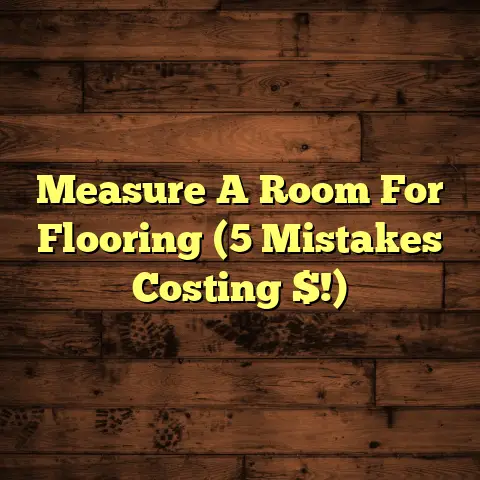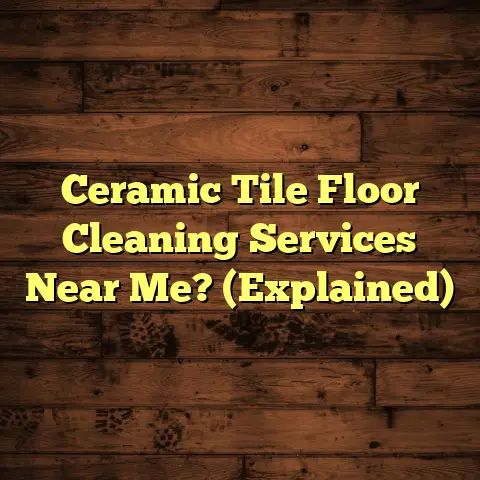Epoxy Flooring Vs Vinyl Flooring Cost (Explained)
When considering flooring options for your home or business, the choice often boils down to aesthetics, durability, and cost. Epoxy flooring and vinyl flooring are two popular choices that cater to different needs and preferences. This article will provide a comprehensive comparison of these flooring types, focusing on their costs, benefits, and drawbacks.
Overview of Epoxy and Vinyl Flooring
Epoxy Flooring
Epoxy flooring is a high-performance surface that’s created by mixing epoxy resin with a hardener. It’s known for its durability, resistance to stains, and ease of maintenance. Commonly used in garages, warehouses, and commercial spaces, epoxy can also be applied in residential settings.
Vinyl Flooring
Vinyl flooring is a synthetic product made from polyvinyl chloride (PVC). It’s available in various styles, including sheets, tiles, and luxury vinyl planks (LVP). Vinyl is popular for its affordability, versatility, and comfort underfoot.
Major Cost Factors Impacting Flooring Installation
When estimating the costs of epoxy and vinyl flooring installation, several factors come into play:
1. Area Size
- The total square footage of the area needing flooring will significantly impact the overall cost. Larger areas will generally cost more due to higher material and labor requirements.
2. Material Type
- Epoxy and vinyl come in various types and grades, affecting their price. Higher-quality materials will typically cost more but may offer better longevity and performance.
3. Labor Costs
- Professional installation is often recommended for both epoxy and vinyl floors. Labor costs can vary based on the complexity of the installation and the contractor’s rates in your region.
4. Additional Considerations
- Floor Removal: If existing flooring needs to be removed, this will add to costs.
- Subfloor Preparation: A well-prepared subfloor is essential for both flooring types. Any necessary repairs or replacements will increase expenses.
- Installation Type: Custom designs or complex layouts (like herringbone patterns) will require more time and expertise.
- Room Size/Layout: Oddly shaped rooms may require more cutting and fitting, impacting labor costs.
Cost Breakdown
Epoxy Flooring Costs
- Material Costs:
- Basic epoxy: $2 to $5 per square foot
- High-end epoxy: $5 to $12 per square foot
- Labor Costs:
- Installation: $3 to $10 per square foot
- Total Estimated Cost:
- For a 500 square foot garage:
- Low-end: $2,500
- High-end: $6,000
- For a 500 square foot garage:
Vinyl Flooring Costs
- Material Costs:
- Standard vinyl: $1 to $3 per square foot
- Luxury vinyl: $3 to $7 per square foot
- Labor Costs:
- Installation: $2 to $5 per square foot
- Total Estimated Cost:
- For a 500 square foot room:
- Low-end: $1,500
- High-end: $4,000
- For a 500 square foot room:
Comparing Costs: Epoxy vs Vinyl
| Cost Factor | Epoxy Flooring | Vinyl Flooring |
|---|---|---|
| Material Costs | $2-$12/sq ft | $1-$7/sq ft |
| Labor Costs | $3-$10/sq ft | $2-$5/sq ft |
| Total Cost (500 sq ft) | $2,500-$6,000 | $1,500-$4,000 |
Signs Your Floors Need Replacement
Both epoxy and vinyl floors can last for years, but there are signs that may indicate it’s time for replacement:
- Visible Damage: Cracks, peeling, or deep scratches.
- Water Damage: Signs of warping or mildew.
- Age: Floors that are over 10-15 years old may need replacing.
Refinishing vs Replacement
Refinishing hardwood floors can extend their life significantly. However, if the damage is extensive or the floor has lost its structural integrity, replacement may be the better option.
Considerations for Refinishing:
- Cost-effective compared to replacing.
- Preserves the original character of the floor.
Considerations for Replacement:
- New styles or materials may better suit changing design preferences.
- Significant damage or outdated materials may warrant new flooring.
Pros and Cons of Epoxy vs Vinyl Flooring
Epoxy Flooring
Pros:
- Highly durable and resistant to stains.
- Easy to clean and maintain.
- Seamless finish reduces bacteria growth.
Cons:
- More expensive than vinyl.
- Requires professional installation for best results.
- Can be slippery when wet.
Vinyl Flooring
Pros:
- Affordable and versatile.
- Comfortable underfoot.
- Water-resistant options available.
Cons:
- Less durable than epoxy.
- Can be susceptible to scratches and dents.
- May emit VOCs (volatile organic compounds).
Professional Installation vs DIY
Professional Installation
Hiring a professional ensures proper installation, reducing the risk of common issues like buckling or uneven surfaces. Expect to pay around $2-$10 per square foot for labor.
DIY Installation
While DIY can save money on labor costs, it requires tools and skills. You’ll need:
- Measuring tape
- Utility knife
- Trowel (for epoxy)
Considerations:
- Mistakes can lead to costly repairs.
- Lack of experience may result in subpar finishes.
Questions to Ask Hardwood Flooring Contractors
When hiring a contractor for your flooring project, consider asking:
- How long have you been installing flooring?
- Can you provide references or examples of past work?
- What type of warranty do you offer?
- How do you handle unexpected issues during installation?
- What preparations should I make before installation?
Care and Maintenance Tips for Longevity
To maximise the life of your epoxy or vinyl flooring:
Regular Cleaning
- Sweep or vacuum regularly to remove debris.
- Use a damp mop with mild detergent for deeper cleaning.
Preventive Measures
- Place mats at entrances to reduce dirt and moisture.
- Use furniture pads to prevent scratches.
Monitor Climate Conditions
- Maintain stable indoor humidity levels to prevent warping or cracking.
Conclusion
When comparing epoxy flooring versus vinyl flooring, costs are just one factor among many to consider. Both have unique advantages and disadvantages that cater to different needs and preferences. Understanding the factors that impact installation costs will empower you to make informed decisions about which option best suits your space. Whether you opt for the durability of epoxy or the affordability of vinyl, ensuring proper installation and maintenance will help your floors last for years to come.





